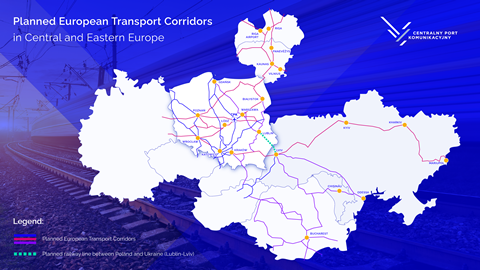Centralny Port Komunikacyjny (CPK), Poland’s major transport infrastructure project, can play a pivotal role in supporting Ukraine’s post-war reconstruction and its path towards integration with the European Union (EU).

CPK’s commitment to Ukraine’s recovery was recently underscored when it signed the Ukraine Business Compact during the Ukraine Recovery Conference in London.
The Ukraine Business Compact is a commitment by leading businesses to support Ukraine in its recovery and reconstruction, helping the country to emerge from the war as a stronger and more prosperous state. CPK’s involvement in this initiative is a testament to its belief in the transformative power of transport infrastructure, which the International Monetary Fund estimates can generate 3 USD in GDP for every 1 USD invested in the long term.
Mikołaj Wild, CEO of CPK, emphasized the importance of this commitment, stating, ‘Our support for Ukraine in its reconstruction efforts and its path towards EU accession is unwavering. We see Ukraine as a crucial element of the region, and boosting its connectivity with the EU presents us with a challenge that we shall overcome together. We already share our railway standards with the Ukrainian side and cooperate on cross-border rail links with Poland.’
One of the key pillars of Ukraine’s Recovery Plan is the development of its railway infrastructure. Already in January of this year, CPK and Ukrainian Railways signed a Memorandum of Understanding to develop new railway connections between Poland and Ukraine, including a Warsaw-Lviv-Kyiv High-Speed Railway line.
CPK plans to announce a tender for a feasibility study for a cross-border railway line in the European standard gauge to Lviv this year. The Lublin-Lviv High-Speed Railway line would create the shortest and fastest connection between central Poland and Ukraine, contributing to the country’s reconstruction and its connectivity with EU. The line is planned for both passenger and freight traffic, with all the technical parameters to ensure full interoperability with the EU standards for rail infrastructure.
‘Our target travel time on a future Warsaw-Lviv line is around 3 hours,’ Wild added. This line would not only create the fastest connection between Poland and Ukraine, but it would also spearhead the development of the Ukrainian High-Speed Rail system. It is of strategic importance for the whole region.
In the future, the High-Speed Rail line could be extended further from Lviv to Kyiv, forming a backbone for a new Ukrainian High-Speed Rail system. Such a line could be also extended from Lviv south to Romania. This would create the shortest North-South connection between the Baltic and Black Sea ports, eliminating the need for crossing the Carpathian Mountains. It would boost the flow of goods and passengers along the North-South axis, strengthening the resilience of transport routes and enhancing the military mobility capabilities in the region.
As Ukraine embarks on its journey of recovery and reconstruction, CPK’s commitment to supporting its transport infrastructure development is a testament to the transformative power of connectivity and the role it plays in regional integration and economic growth.

















